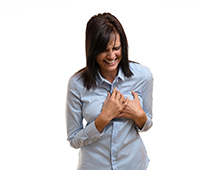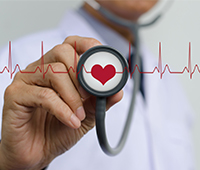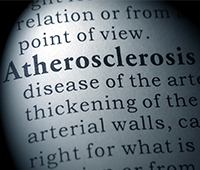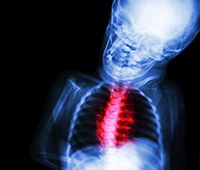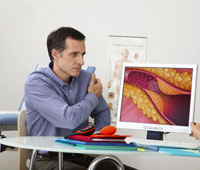WHAT IS Stroke/brain attack
- Definition
- Causes
- Symptoms
- Diagnosis
- Ayurvedic Tips
- FAQS
- References
Definition
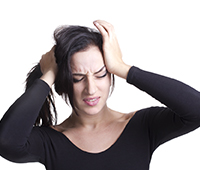
When the blood supply to the brain is severely reduced, the brain tissue gets deprived of oxygen and nutrients, thus causing stroke. Prompt treatment of stroke can minimize brain damage and potential complications.1 In India, the incidence of stroke ranges from 40-270 per 1,00,000 population while approximately 12 % of all strokes occur in the population less than 40 years of age.2
According to Ayurveda, stroke is recognized as Pakshaghata, a disease attributed to an abnormality of Vatadosha (a physiologic entity).3 When Vata gets aggravated, it dries up the Srotas and Snayu (tendons) of one side of the body, making the organ/ parts of that side incapable of functioning and loss of sensation.4
Disclaimer: The information on this page is not intended to be a substitute for professional medical advice. Do not use this information to diagnose or ayurvedic treatment of cardiology and/or stroke/brain attack without consulting the doctor. Consult your physician before beginning an exercise regime. "While we have products /ayurvedic medicines for cardiology and/or stroke/brain attack, you must consult an authorized physician before taking any of the products. For more information on products, visit www.dabur.com or call 1800-103-1644"
Causes
Causes OF Stroke/brain attack
There are two types of stroke which affect the brain in different ways and can have different causes.
Ischaemic strokes are the most common type of stroke which occur when a blood clot blocks the flow of blood and oxygen to the brain. As the age increases, the arteries get naturally narrowed; but certain things can speed up the process. They include:
- Smoking
- Excessive alcohol intake
- High blood pressure
- High cholesterol levels
- Atrial fibrillation - irregular heartbeat
- Obesity
- Diabetes
Haemorrhagic strokes are less common type and occur when a blood vessel present within the skull bursts causing it to bleed into and around the brain. A high blood pressure weakens the arteries in the brain and ruptures them causing haemorrhagic stroke. Causes of high blood pressure are:
- Overweight or obesity
- Lack of exercise
- Stress
- Excessive amounts of alcohol
- Smoking
Disclaimer: The information on this page is not intended to be a substitute for professional medical advice. Do not use this information to diagnose or ayurvedic treatment of cardiology and/or stroke/brain attack without consulting the doctor. Consult your physician before beginning an exercise regime. "While we have products /ayurvedic medicines for cardiology and/or stroke/brain attack, you must consult an authorized physician before taking any of the products. For more information on products, visit www.dabur.com or call 1800-103-1644"
Symptoms
Symptoms OF Stroke/brain attack
The signs and symptoms of a stroke vary from person to person.
- Face– the face may have dropped on one side; the person is unable to smile or drooping of arm or mouth
- Arms– the person may not be able to lift both arms and keep them there.
- Speech– the person may be unable to talk at all.
- Time– dial the hospital immediately if you notice any of these signs or symptoms.
Disclaimer: The information on this page is not intended to be a substitute for professional medical advice. Do not use this information to diagnose or ayurvedic treatment of cardiology and/or stroke/brain attack without consulting the doctor. Consult your physician before beginning an exercise regime. "While we have products /ayurvedic medicines for cardiology and/or stroke/brain attack, you must consult an authorized physician before taking any of the products. For more information on products, visit www.dabur.com or call 1800-103-1644"
Diagnosis
Diagnosis OF Stroke/brain attack
By knowing the type of stroke and the area of the brain affected by the stroke, appropriate treatment can be determined. The following tests are conducted for diagnosis of stroke:
- Physical examination
- Blood tests
- Computerized tomography (CT) scan or Magnetic resonance imaging (MRI)
- Cerebral angiogram
- Carotid ultrasound
- Echocardiogram
Disclaimer: The information on this page is not intended to be a substitute for professional medical advice. Do not use this information to diagnose or ayurvedic treatment of cardiology and/or stroke/brain attack without consulting the doctor. Consult your physician before beginning an exercise regime. "While we have products /ayurvedic medicines for cardiology and/or stroke/brain attack, you must consult an authorized physician before taking any of the products. For more information on products, visit www.dabur.com or call 1800-103-1644"
Ayurvedic Tips
Ayurvedic Tips Stroke/brain attack
By knowing the type of stroke and the area of the brain affected by the stroke, appropriate treatment can be determined. The following tests are conducted for diagnosis of stroke:
- Physical examination
- Blood tests
- Computerized tomography (CT) scan or Magnetic resonance imaging (MRI)
- Cerebral angiogram
- Carotid ultrasound
- Echocardiogram
Diet Recommendations (Aahar)
- Include horse gram onion, garlic black gram, radish, ash gourd, green gram, ginger regular in diet
- Include fruits like pomegranate, mango and grapes.
- Consume low fat and high fiber diet
- Avoid excessive use of pungent, astringent, salty, oily/ fatty food, bengal gram, peas, barley etc.
- Avoid excessive starvation
- Avoid alcohol consumption, smoking
- Do not discontinue any regular medication without medical advice
Lifestyle changes (Vihar)
- Yogic practices are beneficial
- Practice of Pranayama and meditation
- Perform deep relaxation technique
- Practice Asanas to correct the postural imbalances
- Grasp the spastic arm at wrist with unaffected arm and try pushing it above head regularly for 3-4 times a day
- Avoid over exertion
Disclaimer: The information on this page is not intended to be a substitute for professional medical advice. Do not use this information to diagnose or ayurvedic treatment of cardiology and/or stroke/brain attack without consulting the doctor. Consult your physician before beginning an exercise regime. "While we have products /ayurvedic medicines for cardiology and/or stroke/brain attack, you must consult an authorized physician before taking any of the products. For more information on products, visit www.dabur.com or call 1800-103-1644"
FAQS
FAQS
1.What is angina?
Angina is a chest pain that occurs when the blood supply to the heart muscles is restricted. It happens when the arteries supplying the heart become hardened and narrowed due to build-up of fatty substances known as plaques. This restricts the blood supply to the heart and triggers the symptoms of angina. Angina attack is the pain mostly triggered by physical activity or stress and typically only lasts for a few minutes. There are two main types of angina. During stable angina, the attacks occur due to obvious trigger (such as exercise) and improve with medication and rest, while in unstable angina, the attacks are unpredictable, occurring with no obvious trigger and continuing despite resting. Angina is more common in older adults, affecting men more than women.
In Sanskrit, angina is derived from two words – hriday meaning ‘heart’ and shool meaning ‘thorn’. So hritshoola means ‘a thorn in the heart’. In angina, Ama accumulates in Hirdayvahi channels and cause blockage. Due to the blockage of heart channels Vata dosha is aggravated. Vata symbolizes air or wind. It is dry, mobile, and cool in nature and it causes pain in heart.
2.What can I do to prevent/manage angina?
Ayurveda gives following tips to prevent/manage angina:
- Avoid fatty foods like fried food, milk products such as butter and cheese, full cream milk, oils, etc.
- Include fermented milk products like curds in diet
- Use only vegetable oils for cooking like sunflower, olive, groundnut and rapeseed oils.
- Avoid red meats such as mutton, beef and pork.
- Poultry and fish are beneficial. Fishes with high body oil content must be preferred. Avoid canned fish.
- Mild exercise such as walking, is recommended in patients which good exertion tolerance and stable angina.
- Avoid competitive exercising.
- Meditation and shavasana help restore the tranquility, peace and manage stress
- Pranayam (breathing exercise) should be practiced.
3.What are the causes of high cholesterol?
Many different factors can contribute to high blood cholesterol. They include:
- Unhealthy diet
- Lack of exercise or physical activity
- Obesity
- Drinking excessive amounts of alcohol and smoking
- Underlying conditions like kidney disease, liver disease, hypothyroidism
- Family history of early coronary heart disease, stroke or cholesterol-related condition
4.What physical activities can help better my cholesterol?
Ayurveda recommends following activities to keep your cholesterol in check:
- Yoga asanas and surya namaskara should be performed twice daily for ten minutes each.
- Pranayama, or yogic breathing exercises, helps digestion and cleans the srotas, or channels.
- Sleeping during the day, causes the metabolism to slow and the srotas or channels to fill with Ama. Wake up before six o'clock, and avoid daytime naps.
- Eat meals at the same time every day, and plan to eat the largest meal at lunchtime, when digestion is strong.
- Eat light to avoid indigestion at night
- Transcendental Meditation technique reduces stress and improves mental clarity, making it easier to follow a healthy diet and make healthy lifestyle.
5.What is atherosclerosis?
Atherosclerosis is a serious condition wherein arteries become clogged with fatty substances called plaques, or atheroma. It causes the arteries to harden and narrow, restricting the blood flow and oxygen supply to vital organs, and increasing the risk of blood clots that could potentially block the flow of blood to the heart or brain. Atherosclerosis may lead to life-threatening problems such as heart attacks and strokes.
According to Ayurveda, in atherosclerosis there is an increased Vata in blood vessels causing its degeneration thus making it hard, thin, and rough. Deposits of lipids and calcium represent increase in Kapha (water & earth element) in the degenerated vessels resulting in irregular thickening of blood vessels.
6.What are the causes of atherosclerosis?
Atherosclerosis is a slow, progressive disease. The exact cause is unknown but the damage may be caused by:
- High blood pressure
- High cholesterol
- High triglycerides, a type of fat (lipid) in your blood
- Smoking and other sources of tobacco
- Insulin resistance, obesity or diabetes
- Inflammation from diseases, such as arthritis, lupus or infections, or inflammation of unknown cause
7.What is coronary artery disease?
Coronary artery disease (CAD) is the most common type of heart disease. In India, over one fifth deaths occur due to CAD. There are an estimated 45 million CAD patients in India. An increasing number of young Indians are falling prey to it.
CAD occurs when the arteries that supply blood to heart muscle become hardened and narrowed due to buildup of cholesterol and other material, on their inner walls. As these deposits continue to grow, less blood can flow through the arteries causing less blood and oxygen reaching the heart muscles. This can lead to chest pain or heart attack. Over a period of time, CAD weaken heart muscles and contribute to heart failure or arrhythmias (abnormal beating of heart).
Ayurved scholars have mentioned that diet, anger and emotion are causative agents of CAD and patients who are diagnosed or wants to prevent coronary artery disease should keep a check on all these factors.
8.What puts me at risk of coronary artery disease?
CAD begins with injury to the inner layer of a coronary artery, which may occur sometimes as early as childhood. The damage may be caused by various factors, including:
- Smoking
- High blood pressure
- High cholesterol
- Diabetes or insulin resistance
- Sedentary lifestyle
9.What kind of exercises I can do to reduce blood pressure?
Ayurveda recommends the following exercises to manage and help reduce blood pressure:
- Weight reduction and regular aerobic exercises such as brisk walking, jogging running etc.
- Sarvanga Abhangya (Massage) with specially formulated oils helps to increase elasticity and flexibility. It correct and enhance the blood flow in healthy manners
- Upvasa (fasting), Yoga, Meditation and Gayatri or Omkara uchhara have significant role in management of hypertension
10.How can one identify if one has stroke/brain attack?
The signs and symptoms of a stroke vary from person to person. Main stroke symptoms can be remembered with the word FAST: Face-Arms-Speech-Time.
- Face – the face may have dropped on one side; the person may not be able to smile or their mouth or eye may have drooped.
- Arms – the person may not be able to lift both arms and keep them there.
- Speech – their speech may be slurred or the person may not be able to talk at all.
- Time – dial the hospital immediately if you notice any of these signs or symptoms
Disclaimer: The information on this page is not intended to be a substitute for professional medical advice. Do not use this information to diagnose or ayurvedic treatment of cardiology and/or stroke/brain attack without consulting the doctor. Consult your physician before beginning an exercise regime. "While we have products /ayurvedic medicines for cardiology and/or stroke/brain attack, you must consult an authorized physician before taking any of the products. For more information on products, visit www.dabur.com or call 1800-103-1644"
References
References
- Mamidi P and Gupta K. ROLE OF STROKE UNIT CARE WITH PANCHAKARMA IN THE MANAGEMENT OF STROKE: AN OBSERVATIONAL CASE SERIES. Int. J. Res. Ayurveda Pharm 2014; 5:3 (252 – 255)
- Jaideep SS, Nagaraja N, Pal PK, et al. Modulation of Cardiac Autonomic Dysfunction in Ischemic Stroke following Ayurveda (Indian System of Medicine) Treatment. Evid Based Complement Alternat Med. 2014; 2014: 634695.
- Hemiplegia (Pakshaghata). Ayurvedic approach to some selected diseases. Central Council for Research in Ayurveda and Siddha Department of Ayurveda, Yoga & Naturopathy. Ministry of Health and Family Welfare. 2009.
- Stroke – Causes. NHS 2015. http://www.nhs.uk/Conditions/Stroke/Pages/Whosatriskpage.aspx
Disclaimer: The information on this page is not intended to be a substitute for professional medical advice. Do not use this information to diagnose or ayurvedic treatment of cardiology and/or stroke/brain attack without consulting the doctor. Consult your physician before beginning an exercise regime. "While we have products /ayurvedic medicines for cardiology and/or stroke/brain attack, you must consult an authorized physician before taking any of the products. For more information on products, visit www.dabur.com or call 1800-103-1644"
Know more on Cardiology
